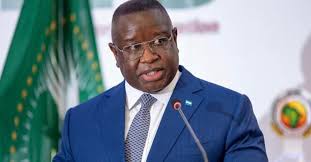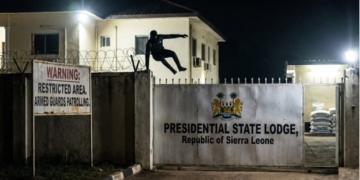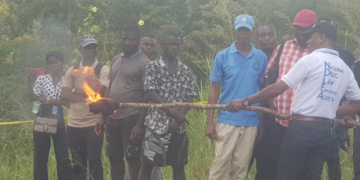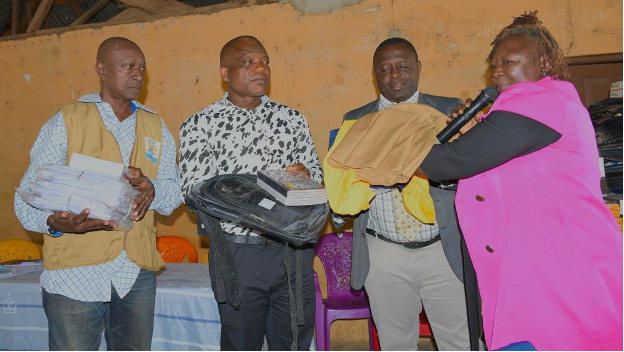By Alpha Amadu Jalloh
When the Union Jack descended from the flagpole and the green, white, and blue of Sierra Leone rose in its place on April 27th, 1961, the air carried the scent of freedom and the echo of dreams. The voices of schoolchildren, the beating of drums, and the solemn pride of the people formed a chorus of hope. Yet, unknown to many, that was also the day Sierra Leone began to sleep.
The dream of independence was supposed to awaken a nation from colonial bondage. But what truly happened was that the minds of our leaders, those entrusted with the sacred duty of building a free and just society, became intoxicated with power. From that day forward, the country began a slow descent into a deep, perilous slumber, a sleep that has lasted more than six decades.
At independence, our motto Unity, Freedom and Justice was not just a slogan; it was a covenant between the leaders and the led. Yet, it was betrayed almost immediately. The Sierra Leone People’s Party (SLPP) and other emerging political factions, instead of building bridges across tribes and regions, built walls. Politics became a tool of division, not development.
In my book Monopoly of Happiness: Unveiling Sierra Leone’s Social Imbalance I wrote:
> “The British planted the seed of social distinction through institutions like Bo School, where they groomed certain children of chiefs to believe they were born to rule and others to serve. That illusion has grown into a national cancer that eats away our sense of equality.”
Bo School was not just a school; it was a laboratory where colonial ideology was refined into class superiority. The British never left Sierra Leone; they only changed their uniforms and surnames. Their protégés became our postcolonial masters. What they learnt as subjects, they perfected as sovereigns. From the very first parliament, corruption was institutionalized. Tribal alliances replaced merit, and public service became an inheritance for the privileged. Those who could not fit into the tribal mosaic were marginalized. Independence, therefore, did not free Sierra Leone; it freed the corrupt to enslave their own people.
To understand the chaos that followed independence, one must return to 1884, the Berlin Conference. There, European powers sat around a table and drew arbitrary lines across Africa, dividing lands and people with the arrogance of mapmakers who had never stepped on African soil. Sierra Leone was shaped not by its people’s will but by the ink of strangers. Those borders were not just physical; they were psychological. They destroyed indigenous unity and replaced it with suspicion and division. The Mende was separated from the Temne, the Limba from the Loko, and identity became a weapon.
The late scholar Walter Rodney once noted that colonialism did not just exploit Africa’s resources, it redefined its humanity. Sierra Leone, like much of Africa, internalized its oppression. Today, our leaders continue to act as if they are accountable not to their people but to the ghosts of Berlin.
> “We inherited borders that divided us, and leaders who learned to weaponize those divisions for personal gain,”
I wrote in Monopoly of Happiness. “That was the greatest tragedy of independence; we did not inherit a nation, we inherited a system designed to fail.”
What began as political rivalry soon morphed into political criminality. The SLPP, APC, and every other formation that emerged from the independence era learned to play the same game, manipulation, patronage, and deceit. The goal was not governance but dominance. From the one-party system under Siaka Stevens to the bloody coups of the 1990s and the disguised democracy of the 21st century, the story has remained the same. Sierra Leone’s political class has perfected the art of plunder.
They enrich themselves while the nation bleeds. Roads are built to nowhere, schools without books, hospitals without medicine, and civil servants without salaries. Yet, every election cycle, the same faces return, older, greedier, and more sophisticated in deception.
Today, corruption has gone digital. We are in what I call the 5G Mode of Political Criminality meaning Greed, Grift, Gimmicks, Ghost Workers, and Godfatherism. Every institution has been wired into this network of deceit. The government functions not as a republic but as a private syndicate.
The British may have departed, but they left behind a machinery of control that continues to hum quietly. They taught our leaders how to divide, manipulate, and rule, and our leaders became their best students. Colonial administrators deliberately fostered ethnic tension by promoting regional favoritism. They ensured that the North and South would forever view each other with suspicion. After independence, instead of dismantling that system, our politicians embraced it.
> “When a nation learns to discriminate within itself, its oppressor no longer needs to return; his work is done,”
I wrote in Monopoly of Happiness. “The master has left, but his mindset lives on in his former slaves.”
The old colonial divide, protectorate versus colony, has evolved into a modern-day caste of elites versus the people. The politicians are the new colonizers, armed not with rifles but with rhetoric. They use tribe, religion, and poverty to maintain control.
Sierra Leone’s politicians have turned deceit into an art form. They campaign as reformers, govern as looters, and retire as saints. Each administration blames the previous one, and every scandal is wrapped in patriotic slogans. In this theatre of deceit, the actors change, but the script remains the same. When a minister is caught in corruption, he invokes tribe; when an opposition member is arrested, he cries persecution. The people, ever forgiving, clap for their own executioners.
The greatest victory of these political criminals is not their wealth but their ability to convince the poor that they are fighting for them. This is how nations die, not with bullets, but with blind loyalty.
April 27, 1961, should have been the dawn of a new nation. Instead, it was the beginning of an endless night. The independence flag did not signal freedom; it signaled the transfer of power from one set of exploiters to another. Our founding fathers did not build a nation; they built a network of interests. The civil war of the 1990s was not an accident; it was the inevitable eruption of decades of betrayal. The same forces that divided us in 1884 and enslaved us in 1961 continue to rule us today, only wearing African faces.
When I look at Sierra Leone now, I see a country in a coma, breathing but not alive. A nation that celebrates mediocrity, rewards dishonesty, and crucifies truth.
The blame no longer lies with the politicians alone. It lies with all of us who enable them, the chiefs who sell their people for contracts, the youths who trade their conscience for a t-shirt, the journalists who turn silence into profit, and the clergy who bless corruption in the name of God.
We have become addicted to our own suffering. Every election, we line up to vote for the same thieves, expecting different results. We defend them on social media, fight for them in the streets, and then cry when our children die in hospitals without oxygen. This, truly, is the tragedy of Sierra Leone, a people who have mistaken endurance for patriotism.
But a day will come, a day to sleep. Not the sleep of the body, but of the conscience. When the songs of independence will fade into echoes, and the green, white, and blue will hang like a shroud over a nation that never woke up. That day, the politicians will be gone, but their ghosts will remain, haunting the ruins of schools, hospitals, and ministries they looted. The children will ask, “What did independence mean?” And silence will be the only answer.
Yet, there is hope still, faint as it may be. For every generation that sleeps, another must awaken. Sierra Leone will rise only when her people learn that freedom is not given by leaders; it is taken by citizens.
Until then, Sierra Leone remains asleep.
> “The real independence we seek is not from Britain or from any foreign power,”
I wrote in Monopoly of Happiness.
“It is independence from the chains we placed upon ourselves, the tribal mind, the corrupt spirit, and the fear of truth.”
When that day comes, when we truly awaken, the dream of April 27th, 1961, will at last be fulfilled. But until then, Sierra Leone, sleep on.























